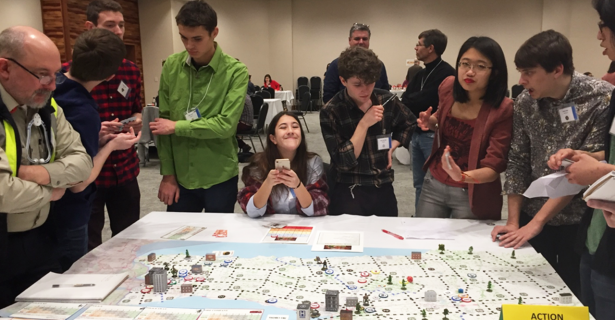As an effort to support the material taught in our ExCollege course we -- seven freshmen along with our two instructors -- attended the Montreal 2019 Connections Wargames conference at McGill University. The Institute for Global Leadership supported our participation in the conference in an effort to strengthen this unique community at Tufts, centered on experiential and simulation-based learning.
On the first day of the conference, we learned about the main issues regarding wargaming in the modern world. We heard from several different speakers such as Ben Taylor and Steve Downes Martin from the Naval War College in Rhode Island, where they explained not only the theory of wargaming but also its importance in the modern world.
They explained how wargaming provides the ability to understand perspectives of different parties, especially in a world of counter-insurgency. Clara Etchegaray (A’22), a Tufts student that attended the conference, said, “The [first day of the] conference gave a me a wider perspective as to the different types of war games, and how the different types of games have different functions for the participants.”
On the second day we arrived back at McGill and almost immediately began the mega game simulation. We all had been assigned various roles in the simulation, some of us with particular significance and importance to the game. Tejus Govani (A’22), another Tufts participant, summarized, “My role was as a Refugee leader. I was to help move refugees north across the Canadian border to escape the coming zombie hoard. We had to make deals with local governments to facilitate our movement. Coordination was possible with the federal government (who were relegated to the other side of the room) but very difficult. We were able to provide Canadian players with “Smuggies” which was a form of currency based on Canadians feeling smug and proud to be helping Americans in their time of need.”
Other students had a variety of roles throughout the conflict simulation. Etchegaray was the representative of the World Health Organization from the UN, which was responsible for aiding the medical institutions in developing research to treat the zombie virus, as well as giving resources to Canadian hospitals to help treat American refugees. Alessandra Jacimovic (A’22) had a unique role as Colonel X, a secretive former Green Beret with the goal of establishing New America on a nuclear power plant in the Georgian Bay. She concluded, “I was ultimately successful in achieving my objective and I learned the importance of subtle, discreet steps that compound over time to have a big impact -- staying undercover and unnoticed paid off in significant ways.”
Each student’s role in the various games played over the two-day conference contributed to their new understanding of conflict resolution. Ava Dimond wrote, “The wargaming conference at McGill University truly expanded my conception of what wargames could look like and what they can be used for. Besides the main simulation— an eight hour zombie apocalypse scenario in which I played the role of a American refugee fleeing into Canada— the sample games played the afternoon of the first day were super illuminating. I played a U.N. Peacekeeper sent to promote stability in a small village. However, subverting expectations, the international body was headed primarily by Muslims from the Global South, and the locale they occupied, ostensibly for “protection” was predominantly Christian and white. The game was an impetus for thoughtful discussion and highlighted the function of role playing as a way to build empathy and widen perspectives.”
From another perspective, Maya Namasivayam wrote that “the conference, when learning about different skills that are needed to truly expand wargaming, (such as the importance of sales) combined with the simulation, was a new experience that opened my mind up to new ways to deal with what to do when faced with conflict. I was a member of UNHCR and had to learn how to not only get my own priorities done but how to assist other nations in times of crisis. Ultimately, seeing how each actor tried to solve their crisis showed the unique ways in which conflict can be solved and the steps that a nation might take to go about it.”
These games produced exciting concepts for each of us about the potential strengths and flaws of wargaming and the necessary steps to strengthen the cross-border American and Canadian wargaming communities.

